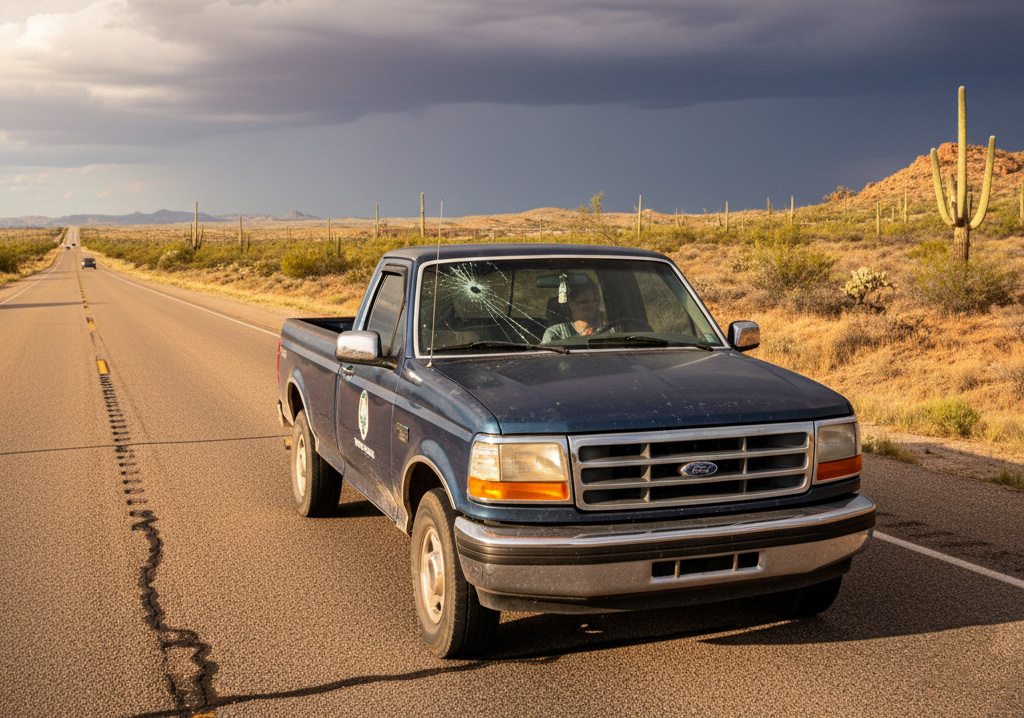If you live in the southern United States, you already know how much the region’s weather and driving conditions can vary. From Texas dust storms to Florida hurricanes and Arizona’s blazing desert sun, every southern state brings its own unique challenges for your windshield. While a cracked or chipped windshield might seem minor, southern hazards can quickly turn a small flaw into a costly or even dangerous problem.
This article breaks down the most common windshield hazards across the South, how they affect your auto glass, and practical ways to protect your vehicle.
1. Extreme Heat and Sun Exposure
Common in: Arizona, Texas, New Mexico, Nevada, Southern California
The intense southern heat is one of the leading causes of windshield damage. Prolonged exposure to UV rays and high interior temperatures can cause your windshield to expand and contract, which weakens the glass over time.
How it affects your windshield:
- Existing chips or cracks spread faster.
- Glass can warp or develop stress fractures.
- Wiper blades deteriorate, scratching the surface.
- Rubber seals dry out, allowing dust and moisture to seep in.
How to prevent it:
- Park in shaded or covered areas whenever possible.
- Use a reflective sunshade to reduce interior heat buildup.
- Avoid blasting cold air on a hot windshield; gradual cooling prevents stress cracks.
- Regularly inspect for chips before they spread.
2. Flying Debris and Gravel Roads
Common in: Texas, Louisiana, Alabama, Oklahoma, Arkansas
Many southern highways, construction zones, and rural backroads are hotspots for flying gravel and debris, especially in fast-moving traffic. Even a small rock can cause a chip that grows into a long crack under heat or pressure.
How it affects your windshield:
- Small chips, star breaks, and surface pitting.
- Cracks from temperature fluctuations or vibration.
How to prevent it:
- Keep a safe distance behind large trucks or vehicles carrying loose material.
- Replace wiper blades regularly to prevent scraping.
- Wash your windshield often to remove abrasive dust and grit.
3. Storms, Hail, and Hurricanes
Common in: Florida, Georgia, Alabama, Mississippi, Louisiana, Texas
The South is known for unpredictable weather, including powerful thunderstorms, hailstorms, and hurricanes. Windborne debris, branches, and hailstones can cause immediate, severe windshield damage.
How it affects your windshield:
- Spiderweb cracks or shattered glass from hail impacts.
- Large debris can cause full breakage or displacement.
- Water intrusion through broken seals after storm damage.
How to prevent it:
- During storm warnings, park in a garage or under a carport.
- Use a heavy-duty car cover designed for hail protection.
- Avoid driving in high winds or immediately after a storm when debris is scattered.
4. Dust, Sand, and Desert Conditions
Common in: Arizona, New Mexico, Nevada, West Texas
Dust storms (also known as haboobs) and desert sand are harsh on both paint and glass. The tiny abrasive particles can create micro-scratches that reduce visibility, especially at night or in direct sunlight.
How it affects your windshield:
- Etching and pitting that distort light.
- Reduced visibility and increased glare.
- Premature wear on wipers.
How to prevent it:
- Avoid driving during active dust storms.
- Wash and dry your windshield with soft microfiber cloths.
- Apply a hydrophobic or anti-scratch coating for added protection.
- Replace air filters and wiper blades frequently to prevent dust buildup.
5. Humidity and Temperature Fluctuations
Common in: Florida, Georgia, South Carolina, Louisiana
High humidity and sudden temperature shifts, such as going from a hot, humid afternoon into an air-conditioned car, can stress the glass and weaken seals.
How it affects your windshield:
- Moisture seepage can cause fogging between layers of glass.
- Expansion and contraction lead to stress cracks.
- Mold growth around seals if not properly maintained.
How to prevent it:
- Keep your windshield clean and dry when possible.
- Use your defroster or air conditioning to gradually adjust temperature.
- Check seals and trim for cracks or looseness.
6. Wildlife and Roadside Debris
Common in: Texas Hill Country, Florida Everglades, rural Alabama, Georgia, and Tennessee
Southern wildlife, from armadillos to deer, can unexpectedly appear on rural highways. Even if you avoid direct collisions, sudden braking or swerving can send rocks and debris flying into your windshield.
How it affects your windshield:
- Impact cracks from debris or branches.
- Full windshield breakage from larger impacts.
How to prevent it:
- Stay alert and use high beams when appropriate in rural areas.
- Reduce speed at dawn and dusk when wildlife is most active.
- Keep your windshield and headlights clean for maximum visibility.
What to Do If Your Windshield Breaks
Even with the best precautions, windshield damage can happen suddenly. If you notice a chip or crack:
- Inspect the damage immediately. Small chips can often be repaired if addressed early.
- Avoid extreme temperatures. Don’t wash your car with cold water or blast the defroster if the glass is hot.
- Cover large cracks temporarily. Use clear tape to prevent dirt or moisture from worsening the damage until it’s repaired.
- Get professional help quickly. A damaged windshield can compromise safety systems like airbags and lane assist cameras.
Find Trusted Windshield Shops Near You
Whether you’re facing a crack from a Texas rock chip or a Florida hailstorm, it’s important to get your windshield repaired or replaced by certified professionals. Use Glass.net’s free quote tool to compare prices, read verified reviews, and find trusted local auto glass experts for windshield replacement near you.
Don’t wait until a small chip becomes a safety hazard, get your windshield checked today.

To read more, visit blog.glass.net

